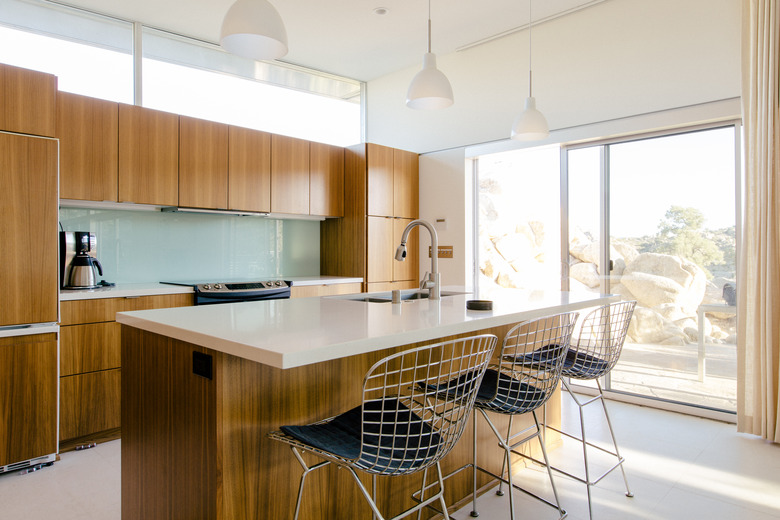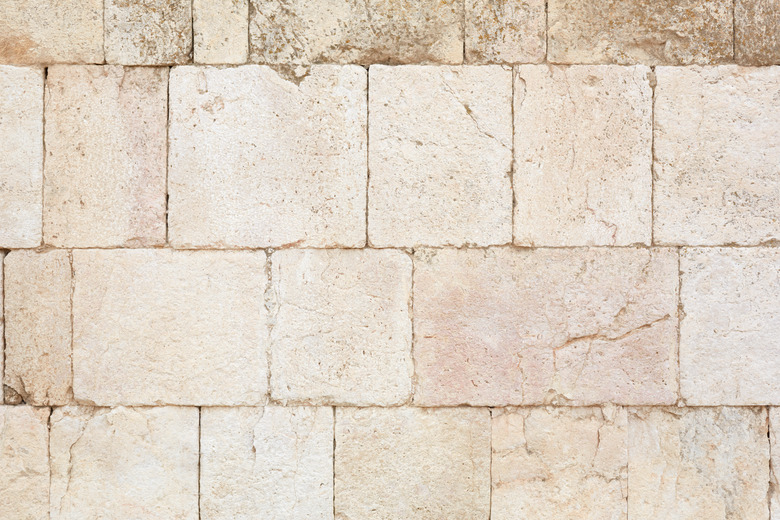What Are Jerusalem Stone Countertops?
Beloved for its natural beauty and rich character, Jerusalem stone can be an enticing choice for homeowners who are looking for new countertops, especially among customers who prefer a natural stone. Learning more about the history, characteristics and maintenance of Jerusalem stone can help you determine if it's the right option for your countertops.
Tip
Jerusalem stone countertops are counters made from a type of natural stone found in Israel. The stone has been used in construction in Jerusalem for centuries and can be found in shades ranging from light pink to dark gray.
What Is Jerusalem Stone?
What Is Jerusalem Stone?
Jerusalem stone is a type of limestone and dolomite natural stone that, as the name implies, comes from the area around Jerusalem as well as from other parts of Israel. For thousands of years, builders in Jerusalem have used the light yellow-gold and pink versions of it. You can see it in everything from the 2,000-year-old Western Wall to new building facades, according to the Jerusalem Post. It's one of the reasons that the city is sometimes referred to as the "Golden City."
Limestone and dolomite types of natural stone form in shallow, magnesium-rich marine environments over millions of years, accumulating pieces of plant debris, mud, coral and animal skeletons as it develops. When you're looking at Jerusalem stone that has been used in building, you may even be able to see some of those fossils. Since heavy fossilization leads to more flaking and degradation of the stone, though, it's not ideal for areas where you want a more solid stone.
Like many natural stones, Jerusalem stone comes in a variety of colors and types. Colors range from pale whitish pinks to dark grays, with goldish yellow being one of the more widely used shades. The color can tell you where in Israel the stone was quarried. A reddish variety can be found in quarries near Jerusalem, whereas golder and grayer stones can be found in the more northern Galilee region.
Jerusalem Stone vs. Other Natural Stone
Jerusalem Stone vs. Other Natural Stone
Some people considering natural stone countertops for their home believe that the different types of stones are interchangeable, but there are some key differences among them. Granite is prized for its durability, while marble countertops are popular because of their gorgeous appearance and ability to handle heat.
Since many natural stones are relatively porous, most need to be sealed periodically for moisture and stain resistance. Jerusalem stone is no exception, although because it has a more naturally matte finish than other stones, a sealer won't make it look quite as polished and shiny as stones like marble and granite.
If you love the look of the matte finish but aren't sure whether you want it for a countertop, you might consider using Jerusalem stone as a backsplash. It's a popular interior design decision that many people are making for a contemporary kitchen since the color and unique appearance of the stone can give rooms a warm brightness. Many people also love it for distressed flooring in a more rustic home.
Factors to Consider
Factors to Consider
There are many factors to consider when deciding if Jerusalem stone is right for your kitchen countertops.
- Durability: Thanks to the dolomite in Jerusalem stone, it's more durable than straight limestone, putting it closer to granite in terms of durability. A good sealant can protect it from many scratches and stains, though it's still susceptible to some, especially if you have a particularly busy kitchen.
- Porosity: Again, because of the dolomite, Jerusalem stone isn't quite as porous as limestone, but it still needs to be protected from water damage. Without regular sealing and quick spill cleanup, moisture can get into Jerusalem stone's tiny holes and cracks, leading to unwanted bacteria growth or staining. Given the more matte finish of Jerusalem stone, though, it can be easier to professionally remove those stains than it is on more polished finishes.
- Maintenance: Jerusalem stone can be cleaned relatively quickly and easily after use with a gentle soap, nonabrasive sponge and warm water. Make sure to dry completely after a rinse, and if you use a bottled or homemade cleaning product on it, make sure it's not acidic, as the stone can break down when confronted with acidity. The stone also requires regular sealing to protect it from scratches, dents and stains. Depending on how often you use your countertops, this could mean about once a year. Before resealing, you might consider doing a deep clean of the countertop just to make sure the crevices are free of debris.
- Appearance: Many people love the look of Jerusalem stone because of its warm coloring and matte finish. It's also a good option if you want your countertop to have a rough edge as opposed to a sleek, even finish. If you're looking for a more clean and polished look, however, you might want to choose a stone that takes polish better.
Cost and Installation
Cost and Installation
The price of Jerusalem stone for countertops can vary depending on the color and type of stone you pick, but it's typically in line with marble. You can expect prices to start around $35 per square foot before installation and rise from there.
You can also expect to pay installation prices on top of that unless you're a highly experienced DIYer since Jerusalem stone can be tricky to work with. Though not quite as porous as limestone countertops, installers still must take care to make sure grout does not make its way into the cracks of the stone and to prevent any scratches or dents from taking place during the process.
Since Jerusalem stone comes from quarries in Israel, you will also have to pay steep prices for transportation if you live outside of that region. This also makes it less of an environmentally conscious option if you're in North America, since the carbon impact of transporting heavy materials across the ocean is high. If you're interested in a limestone countertop (not Jerusalem stone) and live in the United States or Canada, you can generally source the stone from a quarry within 500 miles, which helps to cut back on the cost and environmental impact of construction.
With the right knowledge about Jerusalem stone, you'll be able to decide if it's the countertop material that will grace your home for years to come.

